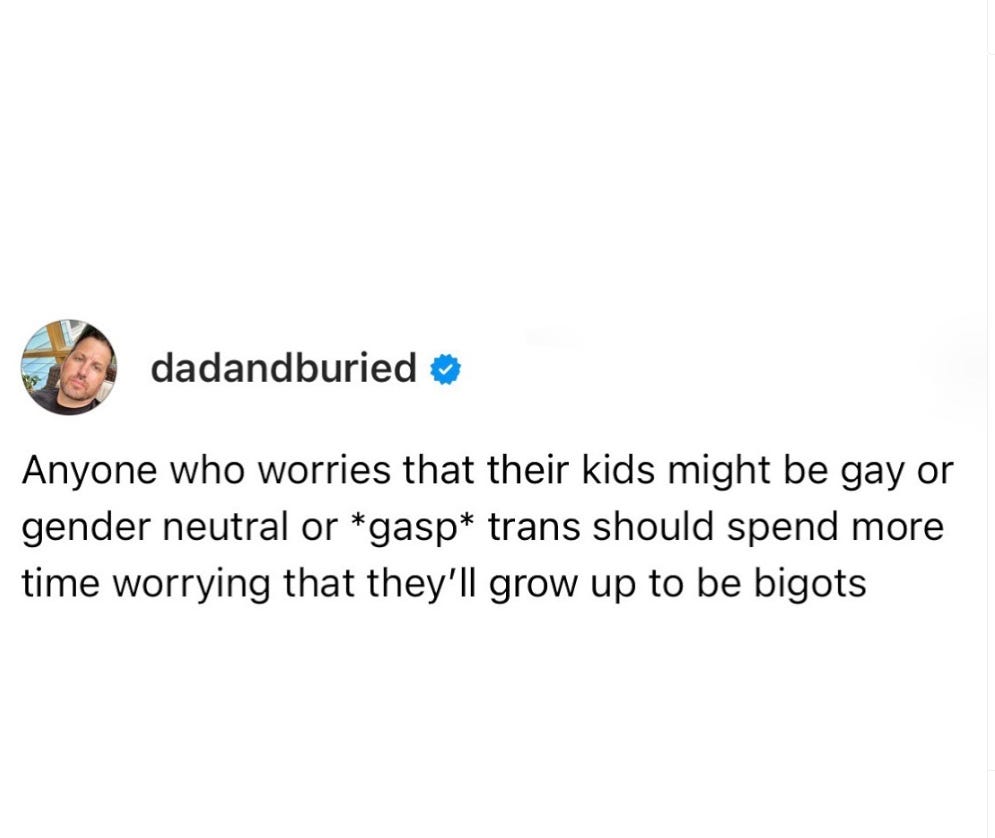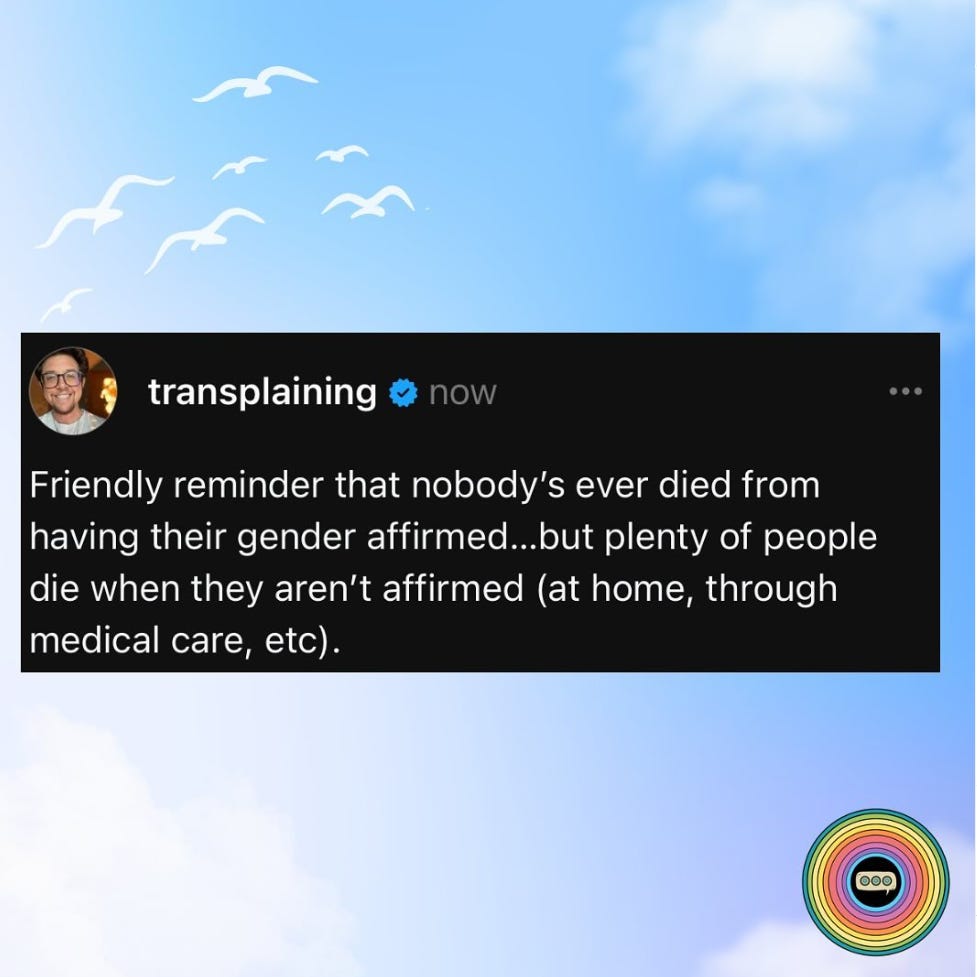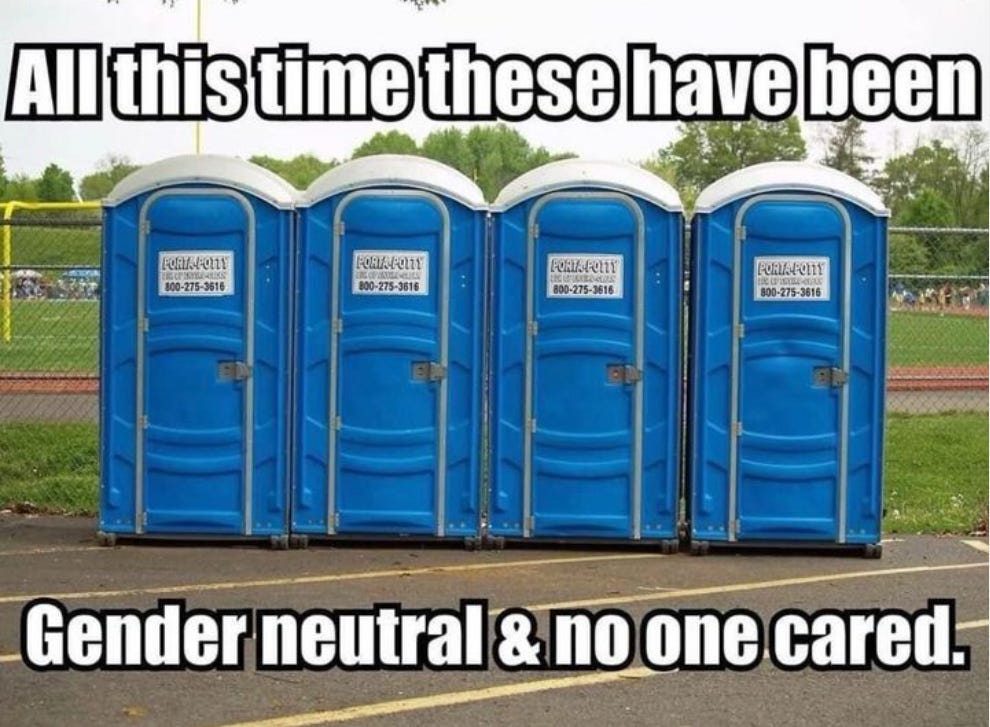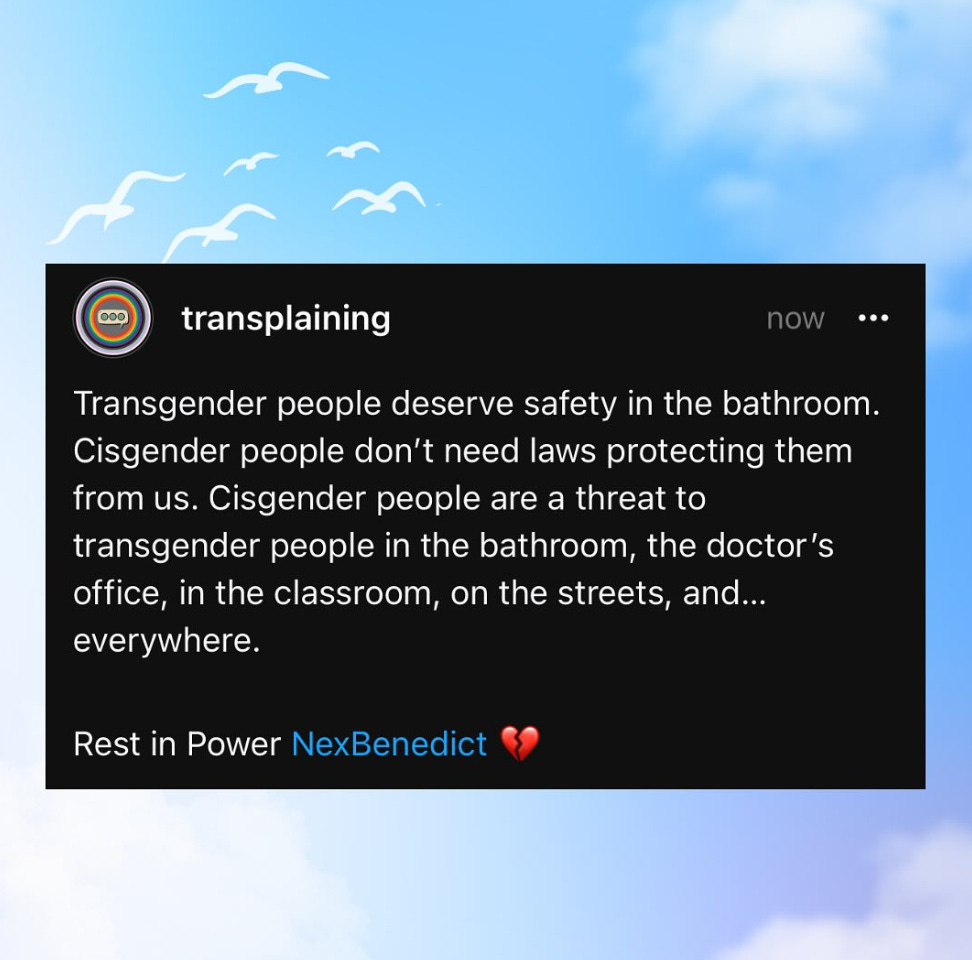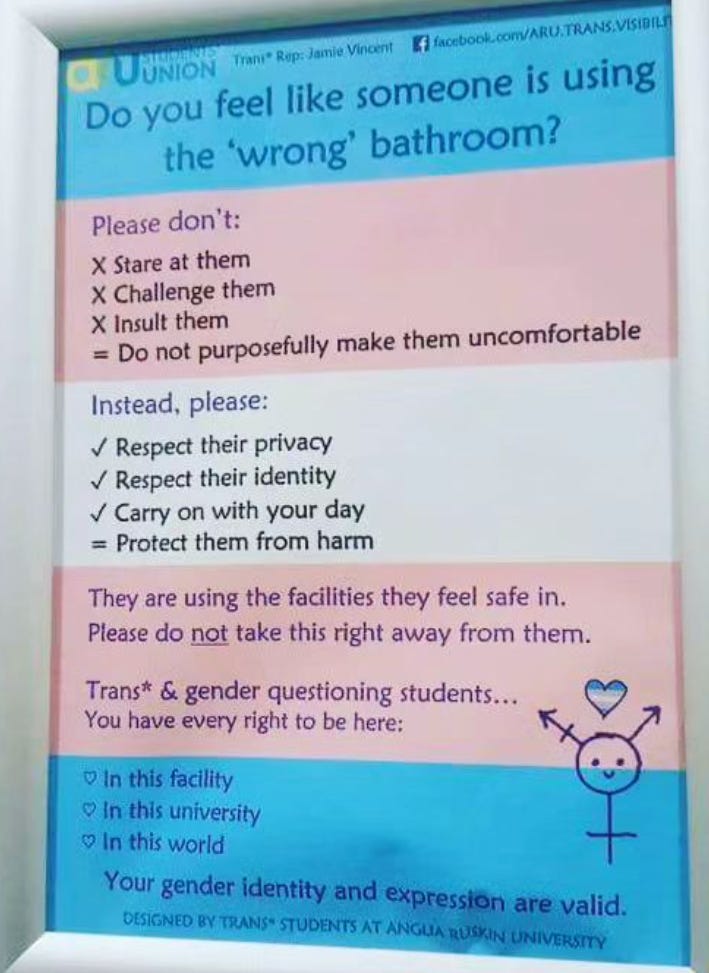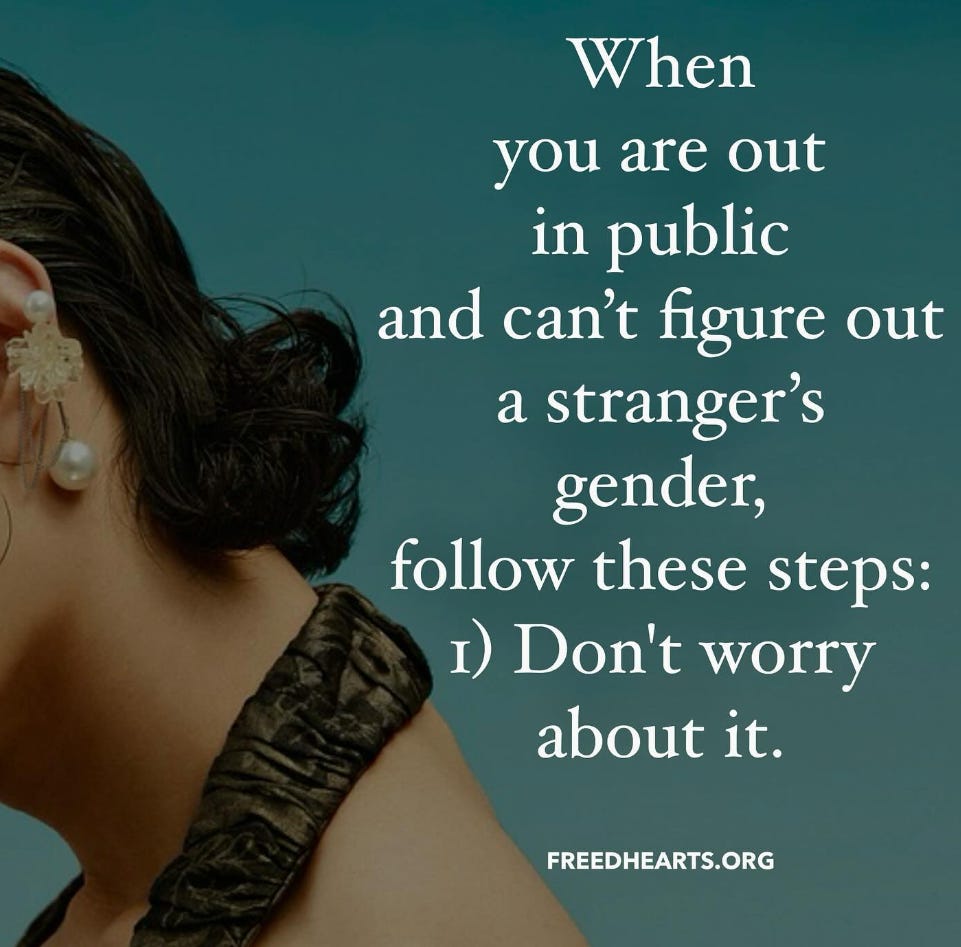(Links to Parts 1, 2, 3, 4, 5, and 6)
Hey friends - let me preface this section by saying that unless a trans person or family member of a trans person has specifically asked us for our thoughts and input, none of us have any right to have strong opinions or judgements about anything related to transitioning. What someone (particularly someone we don’t know) does with their own body (especially when it has zero effect on us) is not our business. One more time: this is not our business.
However, since the human rights of trans folks have (tragically) become politicized and fears abound, let’s wade in…
When I look at concerns that people have regarding trans individuals and the transitioning process, I can see a few broad themes or comments emerge, so let me look at 4 of the most common ones that I’ve come across:
1. “Indoctrination”
The issue of “Indoctrination” comes up a lot, and I did address it in this post about Parents Rights. It seems that people are afraid that their child will be indoctrinated (influenced or manipulated) into becoming trans or queer by learning about or coming into contact with trans or queer people.
So the answer here is just simply: Nope. If it were possible to indoctrinate people into a specific gender identity or sexual orientation, exactly zero people from fundamentalist homes would be gay or trans. Nobody is indoctrinated harder into cisgendered- heterosexuality than Evangelical kids, and yet (surprise, surprise), gay and trans kids from these backgrounds exist without anyone influencing them into it.
I talked about this in Part 3 of this series, but science affirms that gender identity can’t be changed, and that most children have a set gender identity by age 4. You cannot make a cis kid trans, and you cannot make a trans kid cis.
2. Speed of Transition Facilitation
Another concern I’ve seen is that people push back against how “quickly” the transitioning process gets facilitated.
This is a tricky thing to navigate. What is the “perfect” timeline that would apply to each and every trans person? There isn’t one. Who gets to decide what the timeline should be? (Hint: it’s not you or me or politicians or strangers on the internet or people at rallies, or…).
Look, it’s very difficult for most of us (especially those of us from Evangelical backgrounds) to relinquish our sense of control and monitoring of others; we are indoctrinated into the notion that it’s up to us to police everyone around us and have them submit to our judgments and opinions. The bottom line, however, is that people are allowed to make their own decisions, and it’s up to us to stay out of their business and to manage our personal responses to those decisions.
When my friend invited me and Chad to be part of their transitioning process, it felt like it was happening super fast. However, it only felt super fast to us because it was a matter of a few weeks between finding out my friend was trans and having them begin their transitioning process. My friend, however, had been living this reality for decades, had looked into their options, and knew they wanted to make this happen. It wasn’t my job to have my friend slow down in order to accommodate my comfort; it was my job to deal with my internal reactions and simply support my friend in the decision they made.
I understand peoples’ concerns about kids, but hopefully the information I’ve given you has dispelled those fears; it’s up to the trans kid, their family, the medical team, and psychologist supporting them to facilitate a timeline that is in the best interest of that particular child. We need to step back and give them the freedom to do so because it’s not our business.
3. Regret Rates
OK, here’s a doozy: there’s a LOT of pearl-clutching about regret rates and/or people who detransition, and this is often used as justification for limiting or denying gender-affirming care.
So first of all, let me say that gender-affirming care is vital to the well-being of trans kids and adults, and (like I mentioned in the previous post) is supported by every major medical, psychological, and psychiatric association in North America. It’s supported by these associations because there is robust international consensus in the peer-reviewed literature that gender transition, including medical treatments such as hormone therapy and surgeries, improves the overall well-being of transgender individuals. The literature also indicates that greater availability of medical and social support for gender transition contributes to better quality of life for those who identify as transgender.
Next, I want to say that if we’re going to use regret rates as a way of gate-keeping or withholding medical treatment, then we need to eliminate the entire medical profession completely. There is no such thing as a 0% regret rate for anything, let alone any treatment in the medical field. People regret starting or using various medications, treatments, or surgeries.
On April 23, 2024, the American Journal of Surgery published a systematic review on three databases and 55 articles to investigate regret after elective operations and major life decisions. Here are the procedures / life events and regret rates that they found:
Up to 47% regret rate after breast reconstruction
Up to 33% regret rate after body contouring procedures
30% regret rate after a prostatectomy
19.5% regret rate after bariatric surgery
16.2% regret rate after getting a tattoo
7% regret rate after having children
So when people bring up regret rates, please push back against that argument, because it’s disingenuous and somewhat hypocritical.
But since we’re talking about regret rates, what were the regret rates after gender-affirming surgery, you ask?
Approximately 1%. Yup. 1%. Another study found the regret rate after gender-affirming surgery to be 0.3%. It’s low. Extremely low.
However, there simply will be people who transition, and then choose to detransition for a variety of reasons, including unsupportive families and transphobic environments. We can rest assured that the World Professional Association for Transgender Health (WPATH) understands the importance of ongoing surveys and studies to distinguish between normal postoperative distress, temporary forms of grief and regret, and regret due to societal repercussions, surgical outcomes or gender identity.
Gender-affirming care may feel new to mainstream North America but is not new to science and medicine, and a basic tenet of modern medical science is to “examine outcomes, identify potential mistakes, and, when deemed necessary, adjust treatment protocols to improve results for patients… Stronger data on outcomes, including the circumstances that make regret more likely, would also help transgender teens and their parents make better-informed decisions as they weigh the benefits and risks of treatments with potentially irreversible effects.”
As more long-term data becomes available in the decades to come, we can expect to see professionals and experts in the field adjust their guidelines in response to their findings, with the goal of ensuring that regret rates remain low.
In the meantime, researchers of the original study I mentioned concluded that limiting access to gender-affirming services “erases patient autonomy and does not honour the careful consideration and multidisciplinary approach that goes into making the decision to pursue gender-affirming surgery".
Policing gender-affirming care is, once again, not the average person’s area of expertise, and is ultimately not our business. People are allowed to make their own decisions about their own bodies without our interference…even if regret is involved somewhere down the line.
4. Bathrooms
And lastly, we have the whole hullabaloo about bathrooms: both the push-back against gender-neutral bathrooms, as well as the fear that trans women will assault the people they encounter in a women’s bathroom.
So let’s start with the gender-neutral bathroom thing. Here’s my take:
Not one single person truly has an issue with gender-neutral bathrooms. No one.
In fact, every one of us uses gender-neutral bathrooms every single day: the ones in our own homes. When people start fussing about gender-neutral bathrooms, they are simply going out of their way to make life more difficult for trans people. Period.
Gender-neutral bathrooms in public buildings - especially ones that are wheelchair accessible - are part of Universal Design that make life easier for absolutely everyone: a dad who needs to take his daughter to the bathroom but doesn’t want to bring her into the public men’s bathroom, a parent who has a stroller and a couple of kids with them, a husband who may need to bring his wheelchair-bound wife to the bathroom, someone with IBS who is having a gastrointestinal event and doesn’t want to be ill to that level in a public washroom with many stalls, etc. You get the picture. Everyone benefits from having at least one gender-neutral bathroom available in every public space, and this includes schools.
When we accommodate the “least of these”, it benefits “all of these”... everyone gains an advantage.
In terms of being afraid that trans women will assault others in a women’s bathroom? Well, that’s just not a “thing”. It doesn’t happen, and there is no body of real-world examples or any data whatsoever to prove that it does. Trans women are women. If someone is afraid that a man will dress up as a woman in order to infiltrate the women’s bathroom because he wishes to assault someone, then that person isn’t afraid of trans women, they’re afraid of cis men.
Can we please just let trans folks use the bathroom in peace? Using a bathroom is a basic human right, so let’s stop trying to violate that right.
Gosh… this post had a bit of an edgy attitude, hey? The bathroom issue in particular gets my knickers in a twist, especially because I’ve seen first-hand how difficult this can be for my friend to navigate. It absolutely breaks my heart and infuriates me that my buddy has to plan their bathroom breaks when out in public. Ugh and also sigh. Collectively, we need to do better.
OK. See you in the next post where we’ll take a short look at why accurate information and support is so crucial (the statistics are heart-wrenching).
~ K.





